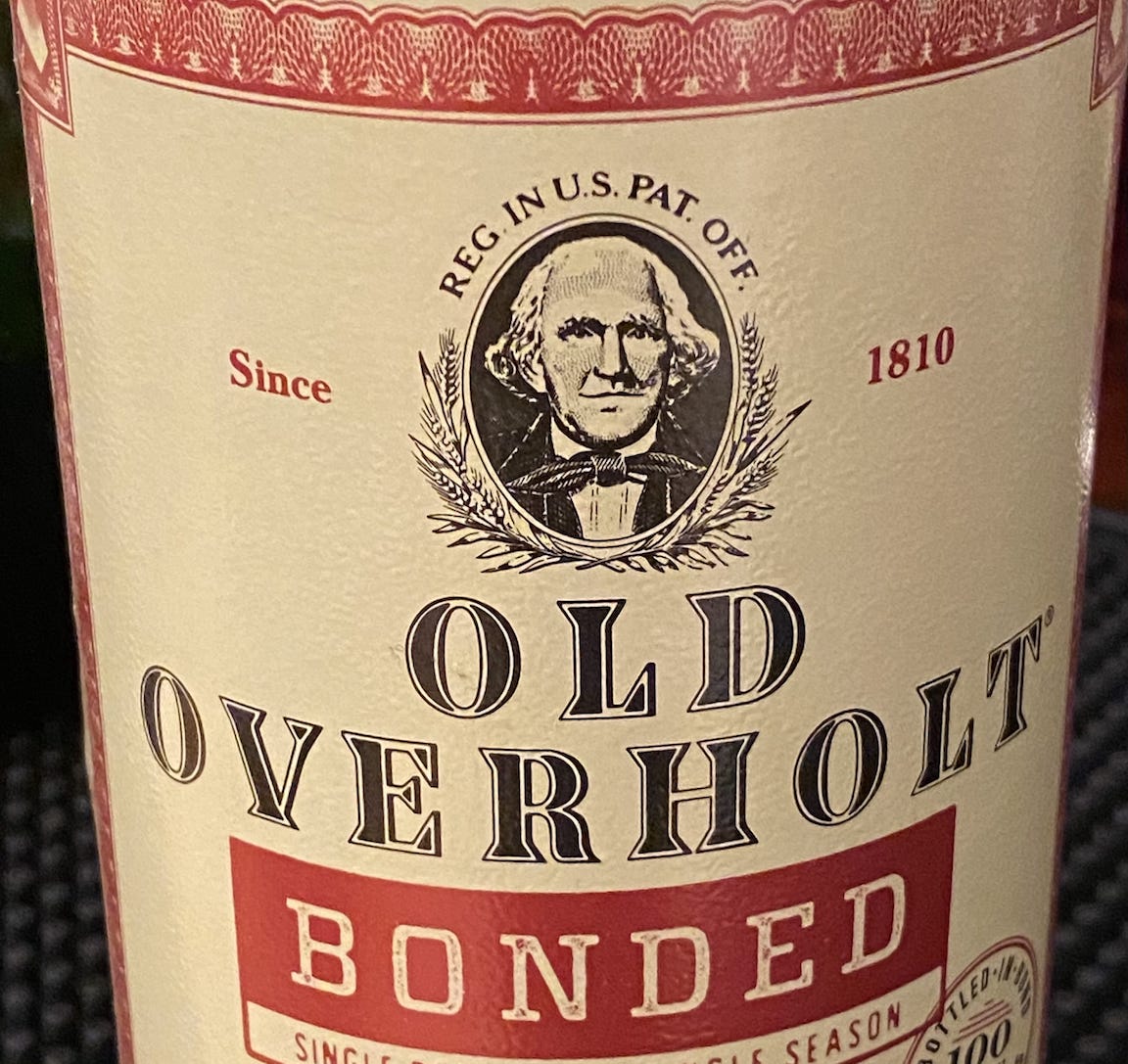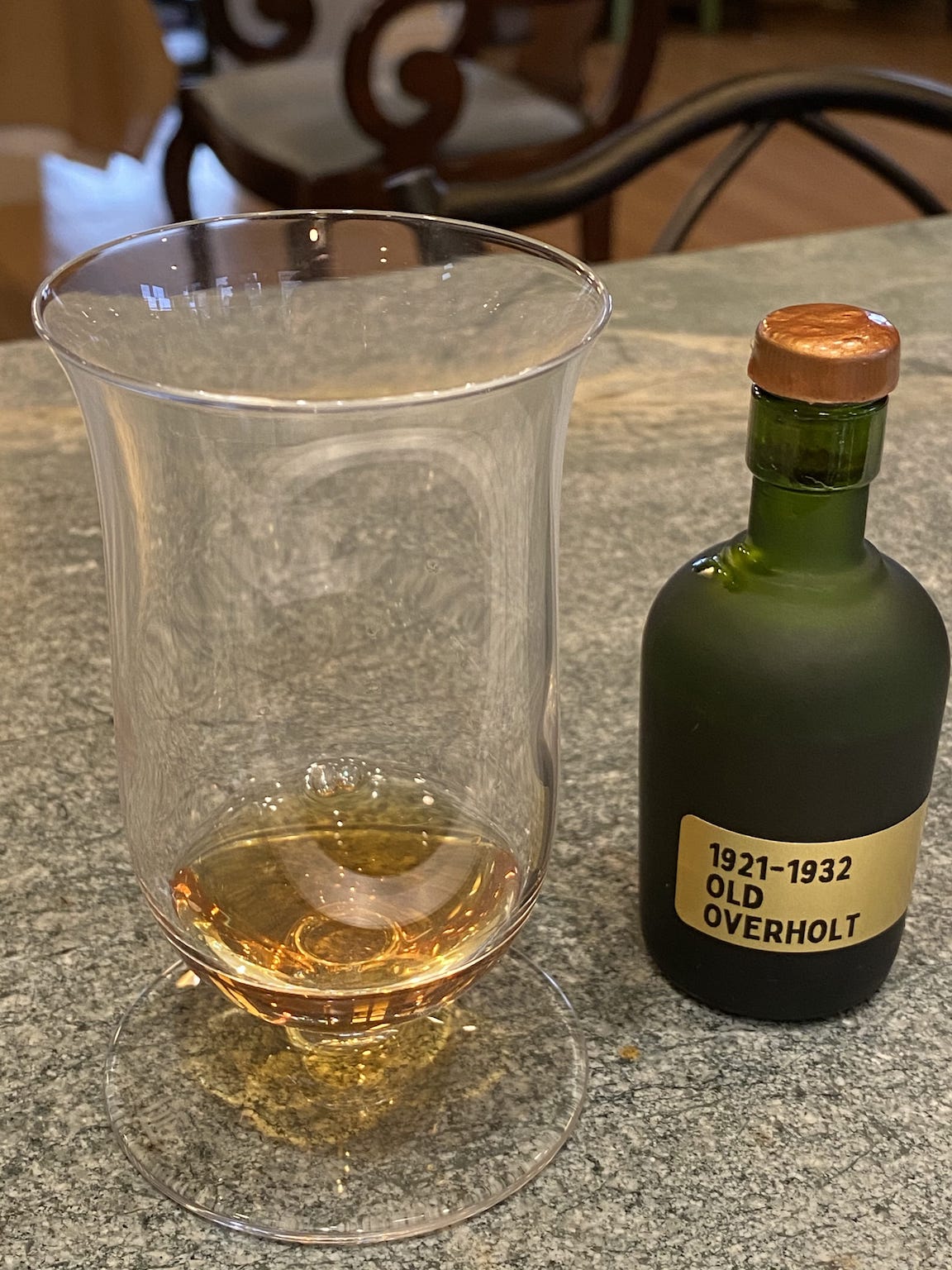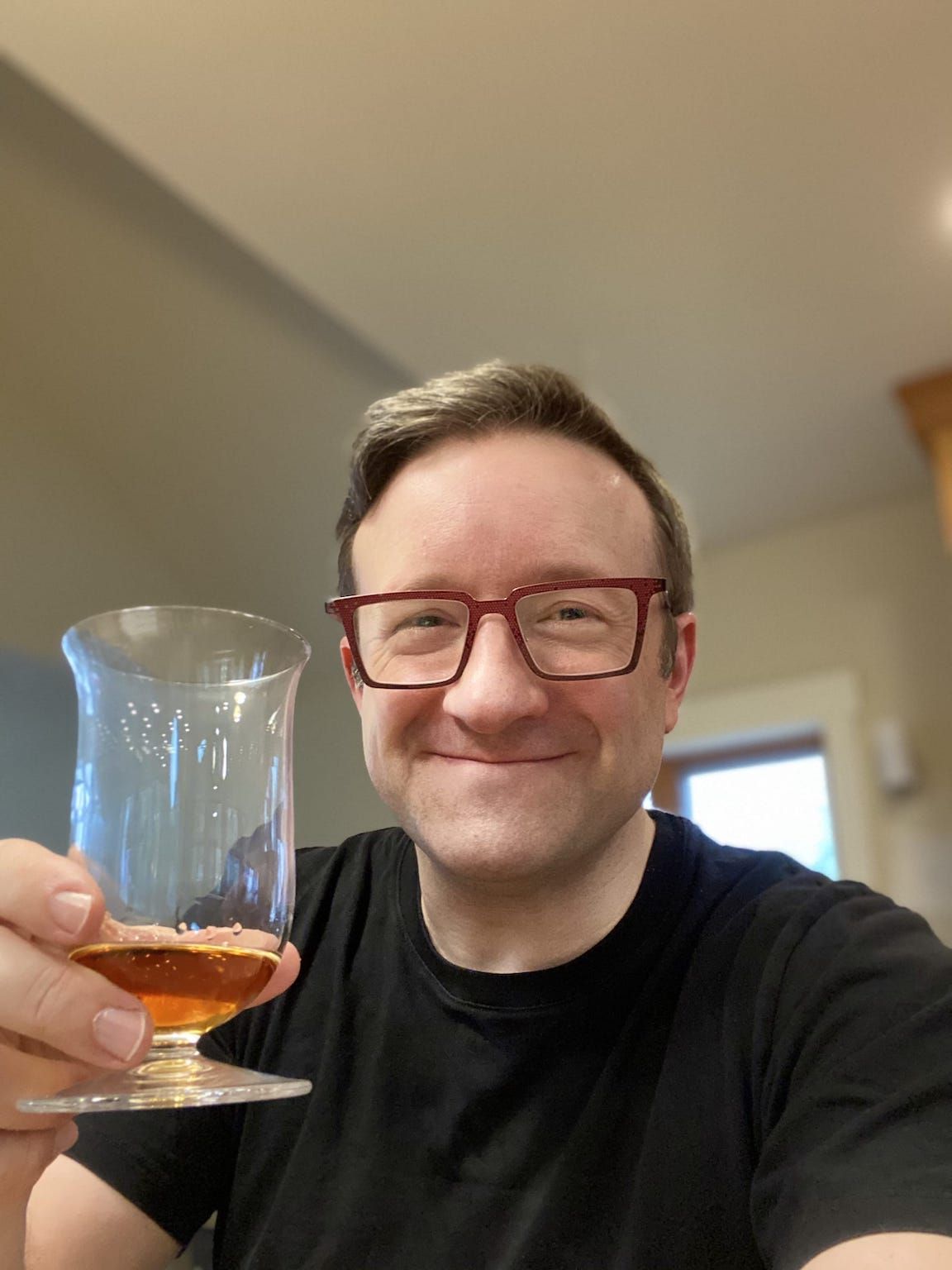A Toast
Jan 21, 2021I would like to tell you a long story about a small drink.
1718 #
My ancestors were immigrants, every single one of them. One small branch of my family tree, out of the hundreds that I’ve traced, started out in Switzerland. They lived there for centuries, until they were thrown out for being slow baptizers. That was apparently a Big Deal back then. They had no nation and no home, so they went to the New World. Upon arrival, they changed their name from Steiner to Stoner, utterly heedless of the distress this would cause me during junior high, or the truly excellent parties it would get me invited to during college.
They set up shop in Pennsylvania, and ended up a bit southeast of Pittsburgh. They were part of a tiny rural Swiss community there.
1810 #
There was another family in that community, and in the old country their name had been Oberholzer. They changed their name to Overholt, grew rye, and as a side hustle they got good at making that rye into whiskey. The scion of the family, Abraham Overholt, grew the still into a full-on business in 1810. By 1832, he was making 55,000 gallons of rye a year.
His whiskey was originally called Old Farm Pure Rye, but after he died, they rebranded as Old Overholt, and put a severe picture of his face on the bottle.

1921 #
My great-grandfather Howard grew up in this same community, a century and a half later. He was a whiskey-drinking newspaperman, and Old Overholt was all he ever drank. His wife, my great-grandmother, was in the Temperance Union. I really don’t understand how that worked, but I'm glad for my sake that it did. At any rate, they had an understanding: when they had people over for dinner, the ladies would have tea in the drawing room, and the men would repair to the upstairs bathroom, where Howard kept a bottle of Old Overholt in the medicine cabinet.
When Prohibition finally came, it devastated the spirits industry in the U.S. Old Overholt only survived because they got a permit to make “medicinal whiskey,” which may remind you of the wink-and-a-nod justification that medical marijuana sometimes had, in the years before broad legalization. When my grandfather was born in 1919, I imagine Howard would have celebrated with a perfectly legal glass of rye. When my grandpa was 2 years old in 1921, I’m guessing Howard would have developed a condition that required medicating with that same rye.
I never met Howard; he died two years before I was born. His wife, my great-grandmother Bernice, lived until I was twelve. From all accounts she was a pretty amazing woman, but by the time I was old enough to be aware of my surroundings, she was suffering from dementia. My only memory of her is of saying hello to her when she came to Thanksgiving, and her pointing at me and saying "Who's that?"
When I was little, my parents had a cool old green leather chair of Howard's in their basement, buried behind piles of other furniture and junk. I used to try to picture him sitting in it, having a glass of whiskey, being grandfatherly. I had some imagined idea of what his face looked like, because I never saw a picture of him. That generation of my family was just barely beyond my reach, and it bothered me.
At some point I asked if we could move the chair into my room, but when we dug it out it was all moldy and ruined, and had to be thrown away.
1950 #
Prohibition was finally repealed, of course, but by that point Old Overholt had been sold out of the family. Tastes changed, Americans stopped drinking rye, and the business fell on hard times. The original distilleries were closed in the 1950s, and Old Overholt bounced between different companies and different distilleries. Reports from the era indicate that the formula changed.
1987 #
Finally Old Overholt became part of Jim Beam, and the new owners seem to have just sold Jim Beam Rye under the Overholt label. There was nothing "Pennsylvania rye" about it anymore; it was made in Kentucky by a bourbon company. At this point it effectively ceased to be anything but a brand. It wasn’t a product in its own right, and it had only sentimental ties to its birthplace.
This part of my family history was effectively gone, and I wasn’t even a legal drinker yet. Again, just out of my reach.
2007 #
I was a new dad, and I couldn’t get to the local pub anymore. Opening a beer at home just wasn’t as fun as having one of my nerd bartender friends recommend me a Flemish sour, or some other brew with a wild flavor that I’d never heard of.
Also, I’d spent years focusing on cooking as a hobby, but had married a incredible woman who was also a much better chef than I was, and I was spending much less time in the kitchen.
I needed an outlet, and turned to cocktails. After a dark period where I made some very clumsy drinks, I started to learn basic stuff, like that both the Old Fashioned and the Manhattan were traditionally made with rye. I went to the liquor store to get some, and Old Overholt was all they had.
I had no idea the old man glaring at me from the picture on the bottle was a relative.
2015 #
For eight years I gradually learned more about cocktails and liquor. I’d learned a tiny bit more about Pennsylvania rye and how it had gone extinct. From genealogical research and talks with my dad and aunt, I'd found out that not only had my family consumed its share of Old Overholt, we were distantly related to the Overholts.
Laurel and I went on a date to celebrate a wonderful new job I'd gotten, and made our way to Canon. When the server brought our cocktail menus, she also brought their captain’s list of some 4,000 spirits.
The list is many pages long, and I skimmed through idly, until I discovered they had Old Overholt from the 1950’s...and as far back as 1901.
This is one of the fascinating things about liquor. Wine ages in the bottle, and it gets better for a while, and then it gets worse. Liquor, however, contains so much alcohol that it doesn’t change much once it’s in glass. So, assuming it’s kept under decent conditions and sealed well, liquor can last essentially forever. That means that if you found a bottle that belonged to your great-grandparents, when you drank it, it'd still be the same.
In life, how many sensory experiences are equivalent to this? You can look at an old photo, but maybe it doesn’t have color, and it isn’t three-dimensional. Something has been lost in the intervening decades. With preserved liquor, you can share an experience with people that died before you were born.
It is hard for me to express just how much I wanted that experience in that moment. The catch was that a single pour of these vintage whiskeys will set you back anywhere from a couple hundred to north of a thousand cash American dollars. I couldn’t justify spending like that on a whim, so instead I set myself a goal: I’d get myself a promotion at work, and I’d “invest” part of my raise in communing with my ancestors.
I left the bar feeling proud of my self-control.
2016 #
Leonard Cohen died. And the next day, there was the election.
I thought how strange it would be to die at a time like that, with so much hanging in the balance, and not know how the movie turns out.
On Saturday Night Live that week, Kate McKinnon opened by performing Hallelujah dressed as Hillary Clinton. It was bravely, beautifully done, but it was also one of the most searingly sad things I’ve ever seen, and I haven’t been able to go back and watch it since.
The musical act that night was A Tribe Called Quest, my very favorite hip-hop group. They'd just released their first new album in decades. They performed in front of a giant mural of their MC, Phife, because he had died six months before. He was only 45.
Life just generally got worse from that moment.
Within a year, the delightful company I’d joined started struggling, and so did I. The company got smaller. There was less to look forward to. There was more and more stress.
That promotion I’d been hoping for failed to materialize. Every year at review time I’d make plans for my glass of old whiskey, and every year I came away discouraged.
2018 #
My friend Leah died.
I met her because we were floormates in our freshman dorm. She was there for so many of my formative experiences. Indeed, she served me my very first mixed drink (admittedly a horrifying vodka Pepsi).
Leah died from alcoholism. She was only 44. Sometimes I think about how my hobby can kill people.
I flew to Minnesota for her memorial, and kept thinking about how awful it was to lose her at that specific moment, seeing America at its most disappointing. She didn’t get to see the part of the movie where things get better.
At the memorial, I held it together relatively well, until the string quartet started playing “Hallelujah.”
2020 #
COVID gave me a giant carpe-diem kick in the ass. Canon closed in the pandemic, like every other bar, and when they reopened for takeout they didn’t offer pours from the captain’s list. There was serious danger they'd close down for good, and deprive the world of one of its very best bars. It was looking like my drink might never happen.
Promotion season rolled around again, and despite all my efforts, I was told I’d need to keep waiting. After five years, and watching so many things get worse, until finally a literal plague swept the land, I had run out of reasons to be patient. A couple months later I had a new job that I really liked. It wasn’t a promotion, but it was an improvement, and it was on the eve of the next presidential election. I figured I'd earned it.
I emailed Canon and asked if they’d consider doing a takeout pour, told them my whole weird story about why I wanted this whiskey specifically, and they were into it. Their very oldest pre-Prohibition bottles weren’t available, but they were willing to put two ounces of old whiskey in a takeout container for me.
There were three or four different vintages to choose from. I did a little research online to figure out what would be the best choice, but it turns out there aren’t a ton of Yelp reviews for this kind of product. In the end, Jamie Boudreau gave me some good advice, and I settled on the 1921. It was that “medicinal whiskey” that was distilled when my grandfather was a toddler, and then bottled when he was a teenager.

They packaged it up in a beautiful little labeled green glass apothecary bottle, sealed with wax. I took it home, but I couldn’t quite bring myself to drink it yet. I decided to wait for the election results, either to celebrate or console myself.
Then, of course, they were unable to determine a winner on election night. After a long week of mild nausea and jitters, I woke up on that sunny Saturday morning to the news that it was finally over. The networks had called it, because Biden had won Pennsylvania.
We spent that morning packing to leave for vacation; probably the only vacation we’ll take until this virus passes. We had probably 200 miles to drive that day, and it was not quite 11 AM. My family went out and piled into the car.
I stayed behind for just a minute, and I poured exactly half an ounce of that hundred year old Pennsylvania whiskey into a nice glass, and I sipped it at my kitchen table by myself in the mid-morning.
We’ve all had the experience where you finally try something you’ve anticipated for a long time, whether it be a drink or a restaurant or a Star Wars prequel, and it’s just nothing special. Unfulfilled hype feels like betrayal. Pappy Van Winkle had that effect on me when I finally got a taste of it; I could have swapped it for a $30 bottle of bourbon and been fine with the trade.
This whiskey was rich and delicious and intense, better than anything I've had. It was spicy and sweet, and incredibly smooth even at 100 proof. It was remarkable to think about a time when we'd had it so good that this was run-of-the-mill stuff, and that we'd thrown that away.
I raised my glass to the empty room and silently toasted:
To unmet ancestors, and absent friends, and those who left during the sad part of the movie.
It's been a bad few fucking years, America. But the movie isn't over yet. I recommend that you break out the good stuff.
Cheers.

Acknowledgment: Much of the historical detail about Old Overholt in this post comes from David Wondrich's article about the history of Pennsylvania rye, which I highly recommend if you find this kind of thing interesting.
Webmentions (23)
- @estoner Evan, this was spectacular, and EXACTLY what I needed to read this morning.
- @KatiLT Thank you, that really means a lot. It’s helping me process.
- @estoner What a tremendous story Evan ❤️ Last night, I lit a candle for those who left during the sad part of the story, but I wish I’d toasted them instead. Cheers, friend
- liked this
- liked this
- liked this
- liked this
- liked this
- liked this
- liked this
- liked this
- liked this
- liked this
- liked this
- liked this
- liked this
- liked this
- liked this
- liked this
- liked this